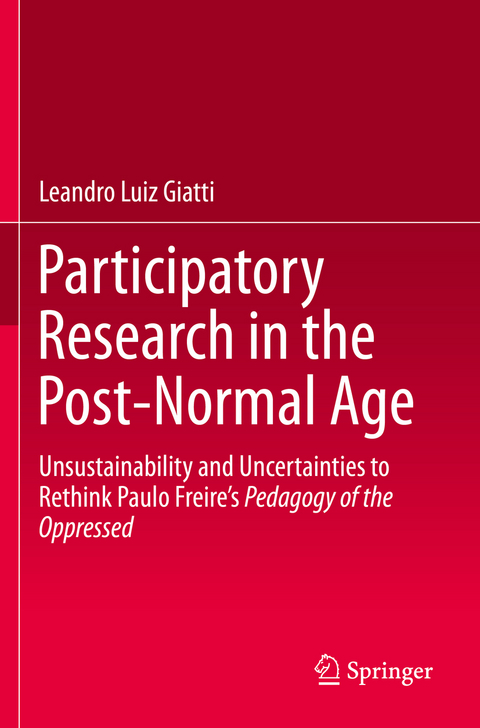
Participatory Research in the Post-Normal Age
Springer International Publishing (Verlag)
978-3-030-27926-4 (ISBN)
This book shows how participatory research can provide tools to overcome the current epistemic and ethical challenges faced by traditional scientific approaches. Ever since Funtowicz and Ravetz proposed the notion of post-normal science, there has been a growing awareness of the limits of a form of knowledge production based only on the traditional scientific peer communities that excludes other social groups affected by its results and applications. The growing uncertainty and complexity posed by socio-ecological issues in the interactions between science, society and decision making has revealed the importance of a social quality control over crucial decisions that rely on scientific research and the necessary democratization of knowledge to tackle sustainability and health concerns.
Departing from a reinterpretation of Paulo Freire's Pedagogy of the Oppressed, this volume shows how participatory research can contribute to reconnect science and society by extending peer communities through the incorporation of different forms of knowledge and different social actors into research projects. To do so, the author presents a critical review of different participatory research approaches, identifying the elements that distinguish a true participatory research from a traditional one, and proposing a taxonomy of the various participatory methodologies. The volume also analyzes a diversity of social practices and understandings that deal with an ecology of knowledge and its systemic characteristics. Moreover, it demonstrates that uncertainties can be integrated in dialogical processes that open possibilities for a myriad of outcomes.
Participatory Research in the Post-Normal Age - Unsustainability and Uncertainties to Rethink Paulo Freire's Pedagogy of the Oppressed will be of interest to researchers working with participatory approaches in different fields like health, environmental sciences, and education, as well as to practitioners of action research concerned with scientific dilemmas and counter-hegemonic strategies.
Leandro Luiz Giatti is an associate professor in the Department of Environmental Health at the School of Public Health of the University of Sao Paulo (USP) and holds a PhD in Public Health from the same university. Dr. Giatti is the researcher in the Institute of Advanced Studies of the University of Sao Paulo and is an associate editor of the journal "Ambiente & Sociedade". His main areas of research are environmental health, urban sustainability, ecology of knowledge, social-environmental governance, sustainability indicators, sanitation and health promotion.
1. Introduction: The relevance of participatory approaches towards contemporary dilemmas.- 2. Insights from the contemporary contradictions in science-society relationship.- 3. Participation and sustainability.- 4. Adaptive methods.- 5. The need for a taxonomy.- 6. Concluding on the role of participatory approaches for the post-normal age.
| Erscheinungsdatum | 24.12.2020 |
|---|---|
| Zusatzinfo | XII, 135 p. 13 illus., 10 illus. in color. |
| Verlagsort | Cham |
| Sprache | englisch |
| Maße | 155 x 235 mm |
| Gewicht | 237 g |
| Themenwelt | Geisteswissenschaften ► Philosophie ► Allgemeines / Lexika |
| Geisteswissenschaften ► Philosophie ► Erkenntnistheorie / Wissenschaftstheorie | |
| Studium ► Querschnittsbereiche ► Prävention / Gesundheitsförderung | |
| Sozialwissenschaften ► Soziologie ► Empirische Sozialforschung | |
| Schlagworte | Cognitive exclusion • Cognitive Justice • Community-Based Participatory Research • Dialogical research methods • Ecology of knowledge • Knowledge democracy • participatory action research • Paulo Freire • Pedagogy of the Oppressed • Post-normal science • Research methods in social sciences • Science and decision making • science and society • scientific uncertainty • Socially robust scientific knowledge |
| ISBN-10 | 3-030-27926-X / 303027926X |
| ISBN-13 | 978-3-030-27926-4 / 9783030279264 |
| Zustand | Neuware |
| Haben Sie eine Frage zum Produkt? |
aus dem Bereich


